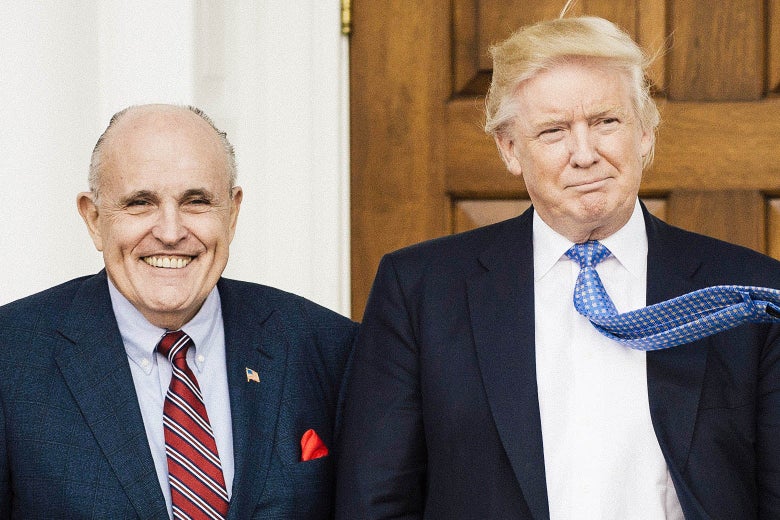The Slatest
Rudy Giuliani and Donald Trump at the clubhouse of the Trump National Golf Club on Nov. 20, 2016, in Bedminster, New Jersey.
Don Emmert/AFP/Getty Images
It was another busy afternoon of news for Donald Trump’s associates caught up in the House’s impeachment inquiry.
The Wall Street Journal reported Monday that Secretary of State Mike Pompeo listened in on the phone call between Trump and Ukrainian President Volodymyr Zelensky that triggered the whistleblower complaint at the heart of the matter.
House Democrats on Monday also announced they had subpoenaed Rudy Giuliani for his records related to the call in which Trump asked the country’s president to “look into” his political rival Joe Biden.
Pompeo and Giuliani are both strident defenders of the president, but Giuliani’s unwillingness to stick to careful talking points has placed the two men somewhat at odds. Giuliani, Trump’s lawyer and attack dog who has repeatedly confirmed his own guilt in the Ukraine story while muddling the White House’s messaging, placed some of the blame for the scandal on the State Department. He insisted that he had “40 texts from the State Department asking me to do what I did.” He asserted repeatedly that when he pressured Ukraine to investigate Biden, he was doing so for upright, officially sanctioned reasons. “A President telling a Pres-elect of a well known corrupt country he better investigate corruption that affects US is doing his job,” Giuliani tweeted after one bizarre CNN interview.
The news about Pompeo, at first glance, might make one believe that Giuliani’s seemingly out-of-control ramblings on cable news had more validity than it appeared. While it was known there were State Department officials on the call, Pompeo’s presence—and the fact that he had conveniently failed to mention it even when asked directly about the whistleblower complaint—seems to point to greater State Department involvement. But the transcript of the phone call still indicates that Giuliani’s directive came from Trump and not the State Department.
Pompeo has not yet addressed the news, but last week, when asked about the whistleblower’s complaint, he said that he had not fully read it and defended the State Department’s actions as “consistent” with the administration’s goal of improving relations with Ukraine, according to the Journal.
Pompeo received a subpoena last week and has until Oct. 4 to produce his records. Giuliani must turn over his documents by Oct. 15. Giuliani said on Friday that if he were subpoenaed, he would follow Trump’s advice as to whether he cooperates. On Monday, he tweeted that the subpoena was only signed by Democrats had “prejudged this case” and that he would give the subpoena “appropriate consideration.” Letters were also sent out on Monday to three of Giuliani’s associates.
In their letter announcing the subpoena, House Intelligence Committee Chairman Adam Schiff, House Foreign Affairs Committee Chairman Eliot Engel, and House Committee on Oversight and Reform Chairman Elijah Cummings cited Giuliani’s comments during his television appearances as evidence of his role in the scandal.
“A growing public record indicates that the President, his agent Rudy Giuliani, and others appear to have pressed the Ukrainian government to pursue two politically-motivated investigations,” the Democrats said in their letter. The first, they said, was a prosecution of Ukrainians who provided evidence against Paul Manafort. The other was the matter involving Biden. (A Ukrainian official has said there was no evidence of wrongdoing by Biden or his son Hunter.)
Trump has reacted to the House Democrats’ quick work on the impeachment inquiry with anger. On Monday, he told reporters, “We’re trying to find out about a whistleblower.” Before then, he had called the whistleblower a “fraud” and suggested that the person who provided the information to the whistleblower was a “spy” who therefore deserved to be punished for treason.
